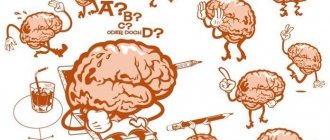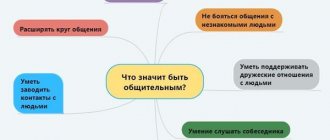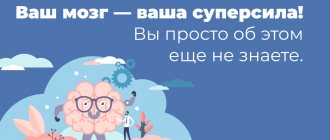Regardless of the current stage in the development of each person, work with intellectual progress and in particular with attention training should never end. This process is as natural as the growth and training of muscle fibers, which occurs throughout life and in the absence of movement, leads to irreversible destructive consequences.
Attention improves the perception of the surrounding world and new knowledge about it, both in children and adults, in the process of their daily social interactions, this function receives training naturally, however, special exercises for the development of attention will help optimize and improve the process of acquiring new knowledge and skills . An attentive student always shows significantly higher results in learning, because he more effectively fills his working memory with the necessary information, filtering out external stimuli.
Controlling your attention is very important in any field of activity; this ability is achieved through regular training; as a result, a person gets the desired result and becomes a valuable employee and an interesting interlocutor who does not lose sight of important details and is not distracted by minor details.
Why does concentration deteriorate?
The first thing that influences our ability to focus on a specific object is our emotional state. If you imagine it in the form of a swinging pendulum, then extreme positions can mean, for example, depression, apathy or, conversely, a surge of bright positive emotions. Both lead to a temporary loss of the ability to concentrate.
Only small fluctuations of this pendulum over a narrow amplitude - from mild fatigue to a cheerful state - are the zone of our optimal performance. Only in this position are we able to concentrate our thoughts, maintain interest in the activity and focus our attention on it.
What can provoke more intense emotional swings and reduce our concentration:
- information overload;
- frequent stress and anxiety;
- poor sleep;
- visual stimuli and noises;
- internal dialogue;
- physiological reasons - lack of vitamins, decreased immunity, etc.
How to improve your concentration
There are various methodologies to improve concentration. They use special techniques. But before we talk about concentration techniques, we need to consider the factors that negatively affect the mind and its ability to concentrate.
Agree that if our mind were not constantly distracted by external stimuli and were more focused, then we would not be looking for ways to increase the efficiency of attention.
Often we study ways to improve attention not because we want to develop it, but because we notice how it has decreased. The length of time during which we are accustomed to concentrating on something has rapidly decreased, and we know the reason for this deterioration.
Human dependence on means of communication
The development of the Internet, mobile technologies, social networks, fragmented communication, and the habit of working in multi-task mode lead to a decrease in attention span and subsequently even to attention deficit disorder.
Separately, I would like to highlight the so-called multi-task ability - performing several tasks at the same time. The new concept of efficiency, which is still almost extolled to the skies and considered one of the characteristics of effective work, in fact leads to the opposite - to disorganization, lack of focus, increased stress and a drop in the quality of task performance.
Mobile devices and endless chatting seem like cute and fun entertainment or a common means of communication in professional activities. However, they bring little benefit to the human psyche. The negative impact of new technologies has long been scientifically proven. But who cares, when a large number of modern people cannot live without checking messages on social networks and instant messengers every hour.
It has already become a kind of addiction. But it is precisely the dependence on technology that creates the appearance of action, the illusion of the fullness of life. If we exclude this component, what will remain? Emptiness, when a person is finally left alone with himself, then he does not know what to do with himself. Thoughts are spinning in your head, you need to come up with something again, another action, what to do, where to go, what music or movie to entertain yourself with again.
Man has already forgotten what silence is. In real external life it does not exist and never existed. What about the inner world? Is there silence there? It would seem a strange question - we don’t talk to ourselves. This is where we are wrong. We're still talking. And all without exception. Listen to your thoughts at this moment. What are you thinking about? What is your mind telling itself? This is how the endless dialogue with ourselves continues, and we don’t even notice it, deafened by the outside world and the noise of its entertainment.
Exercises and ways to improve concentration for adults
In this section, I have collected a variety of methods for increasing concentration that can be performed anywhere, even when you only have a few minutes of free time. Some exercises may seem too simple and boring to you. The main thing is not to be lazy and remember your goal.
More than 100 cool lessons, tests and exercises for brain development
Start developing
Watch
For the next exercise we will need any watch with a second hand. It can be a wall clock, a wrist clock, or a regular desktop alarm clock.
Execution order:
- Sit comfortably and look at the second hand.
- Watch how she makes a circle, a second, a third.
- Try to control your train of thought and not think about anything other than that second hand.
The execution time can be increased with each subsequent workout.
Check
Choose any large number (for example, four-digit) and start counting backwards: 3562, 3561, 3560, 3559, etc. For more advanced people, the task is more difficult: subtract not 1, but 2 or 3 at once. And the simpler option is slow count from 1 to 30. To make it even easier, you can close your eyes.
This exercise will help you calm down and concentrate before an important task, for example, before a speech or business negotiations.
Emphasis on smell
This exercise can be performed at any time and anywhere: while walking, in the office, at home, on a trip, etc. Your task is to concentrate as much as possible on the aromas that you are currently smelling. Maybe it’s the flowers in the flowerbed, coffee in the nearest vending machine, the smell of freshness and wet dust after the rain. Or maybe something not entirely pleasant.
The next stage of the exercise: try to single out one single smell from all this variety. Concentrate on weeding out extraneous aromas and smelling only the one you choose for yourself.
This technique is also good because it helps you return to the here and now and live time more consciously.
Immobility
The principle is to learn to sit for a while in a completely relaxed and calm state.
How to do the exercise:
- Sit as comfortably as possible and try to calm your mind by completely relaxing your body.
- Focus on your relaxation: no muscles should be tense, stiff or tight.
- For the first workout, 3-5 minutes is enough. In the future, you may feel that you are able to sit like this for 10 or 15 minutes.
Fixation of attention
This exercise will also teach you to keep your mind calm and control your focus.
What do we have to do:
- Take a sitting or standing position. The back and neck should remain straight.
- Extend your right arm out to the side so that it is level with your shoulder, palm down.
- Turn your head to the right and fix your attention on your fingertips.
- Try to keep your hand motionless and not look away from it.
Choose the execution time according to your comfort. The hand should not become numb, the body should be comfortable. Aim for a time of 3-5 minutes.
Clenching and unclenching fists
How to do the exercise:
- Sit at the table, place your hands in front of you and clench them into fists so that the clenched fingers point down and the thumb rests on top of the rest.
- Focus your attention on the index finger of your right hand. Start to unbend it slowly.
- Following the index finger, unclench the rest without losing focus.
- Repeat the movements in reverse order: squeeze one finger, then the other, etc.
- Perform 3 repetitions with your right and left arms. Over time, the number should be increased.
Tracking internal processes in the body
How to do the exercise:
- Lie down comfortably, close your eyes and completely relax.
- Focus on your body: run your attention over your muscles and make sure there is no tightness or tension anywhere.
- Alternately direct your focus to different organs and systems of your body. Imagine how the heart pumps and circulates blood through the circulatory system, how it flows to your legs and arms, and how it circulates throughout the body. Feel how your lungs work, how your intestines, stomach, etc. function.
- Do this exercise until you feel a pleasant relaxation in both body and mind.
Breathing technique
This technique is used by people who practice yoga and other eastern practices.
Execution order:
- Starting position – sitting with a straight back.
- Close your right nostril with one finger and take a deep, slow breath, counting to 10.
- Release your nostril and exhale slowly, counting to 10.
- Do the same with the left nostril.
- The number of repetitions is 15–20.
There are a lot of breathing practices in yoga. The simplest is to inhale and exhale very slowly, tracking the movements of the lungs and feeling how air enters them from the environment and smoothly exits.
Reading and retelling
Reading thoughtfully and remembering the information you read requires great concentration. Therefore, the best answer to the question of how to train concentration is to read short texts and retell them orally, even to yourself. This is how the skill of eloquence develops at the same time.
The more you begin to focus on the meaning of the text, the more detailed your story will be. If it is not possible to retell it out loud, describe what you read on paper.
You can modify the technique slightly for those cases when you only have a couple of free minutes. Read two sentences and try to write them down or sound them out word for word.
Word manipulation
There are several variations of exercises using words:
- Take any word and say it out loud backwards. For example, kitchen - yanhuk, fish - akbyr, etc. At first, you can come up with simpler words, gradually complicating the task and turning over longer words.
- Pick a word that you like or inspires and repeat it for a few minutes without thinking about anything. These could be, for example, words such as fidelity, love, inspiration, idea, etc.
- You will need a newspaper, book or magazine. Open any page and start counting the number of words. Next, you should repeat the exercise with the same text for self-test. To make it more challenging, keep the count on 2-3 pages.
- The following technique was invented by photographer Chris Sasaki. Whenever he caught himself thinking that he was in the clouds, he said mentally: “Stop!” or “Attention!” And then he looked around to bring himself back to the moment.
I recommend looking at techniques for developing abstract thinking.
Exercise with a glass of water
Take a glass of water in one hand and hold it straight in front of you. Concentrate on the glass and the effort that keeps both your hand and liquid free from hesitation. You can start practicing from one minute, gradually increasing the time to 5 minutes.
Methods of concentration
A huge number of methods of concentration are aimed at narrowing perception and directing the area of attention along a clearly limited channel. This, of course, makes sense if we want to continue to transform ourselves in the image and likeness of a well-oiled machine. On the contrary, if the goal of our search for the right method is also to improve ourselves as an individual, then we need to approach the choice of methods more responsibly and find ones that would be aimed at the comprehensive development of attention and other cognitive abilities. At the same time, we will not only improve our concentration, but also direct our efforts to improve ourselves as individuals through the study of our spiritual essence. A person’s deep awareness of himself as a unique personality is inseparable from the process of self-knowledge.
Recommendations from experts
In addition to exercises, the following tips will help increase concentration:
- Fatigue has a significant impact on brain activity. The first thing that increases concentration is simple rest. To stay in good shape, it is important to take breaks in a timely manner, not to overexert yourself, take your sleep schedule seriously, breathe more fresh air and monitor your health.
- Try to coordinate your activities according to your biorhythms. I think everyone has heard about owls and larks. If you feel your best performance in the first half of the day, do the most difficult mental work at this time of day. And vice versa.
- Eliminate external distractions. Declutter your desktop, turn off notifications in mobile apps, and don't play music or videos in the background when you're doing something that requires attention. Avoid multitasking whenever possible.
- Set goals. They can be either short-term, i.e. limited in time, or long-term, for the future. When you have a goal, you are usually less distracted by small things.
- The next recommendation for those who work from home: do not sit at your laptop in bed. The sleeping place is intended for sleeping, and the brain understands this very well. And working in such an environment, you try to force yourself to relax and concentrate at the same time, which leads to dissonance.
- If you feel that you are exhausted, but you need to finish the work, take a position that is unusual for you. For example, change the position of your feet, your posture, change your facial expression, cross your legs differently, etc.
By the way, we have another interesting article on how to make your brain work.
Methods for training attention in children and adolescents
Until the age of three, children’s attention is involuntary, that is, it does not depend on their desire. By the age of 5–6, concentration already begins to obey the will of the child, which means that among younger schoolchildren it is already possible to introduce some simple training to develop attention.
Memory game
The goal of the game is to remember the sequence of words as accurately as possible. The parent comes up with a chain of words that the child understands, and the child must remember and reproduce them. To make it easier for your child, it is better to choose words from one category, for example:
- beets, carrots, cabbage, potatoes, onions;
- cat, bear, fox, parrot, grasshopper;
- plane, train, ship, rocket, truck, etc.
This exercise can also be offered to a group of children of 3-4 people. An adult names a chain of words. The first child remembers and names the first word, the second child – first and second, the third – first, second, third, etc.
Find the words
The child is given a series of letters. Some of them are a random set of letters, some are words. The task is to find the words. Here's an example:
BYNSHLKOTDDOPRETORTCCHYLOBDYKVMIN
Younger children can come up with words from one category, for example, animals, fruits, furniture, etc. Older children can be given more difficult tasks: not only to find words, but also to highlight the unnecessary ones. For example, all words are verbs, but there is also one adjective. Or, among words in the singular, find something that is in the plural.
Name the color
A wonderful concentration exercise that is useful for both children and adults. To prepare, you will need a sheet of paper and multi-colored markers or pencils. You need to write the names of the colors in words so that the color in which the word is written does not coincide with the word itself. The easiest way to understand the meaning is from the picture below.
Task: name the color in which the word is written, and not get confused by the very name of the word. You can even arrange a competition to see who can complete the task faster and make fewer mistakes.
Useful tips
Here are a few more useful tips that will help improve your child’s concentration:
- It is also extremely useful for children to read aloud and retell. And so that both hemispheres of the brain are involved, you can invite the child to read poetry and at the same time squat or alternately raise his arms.
- Anything that promotes the development of fine motor skills has a beneficial effect on brain activity. Puzzles, construction sets and other similar games require high concentration and attention.
- To ensure that the student’s attention does not wander when doing homework, the desk should be in order, stationery should be placed in its place, and everything unnecessary should be removed. Lighting also matters: it should be close to daylight.
- You should not interrupt the child in the process of some activity in which he is immersed. It is better to warn him in advance about the need to change classes so that he has time to get used to this idea.
- If the child is very absent-minded and easily forgets about something important, you can prepare notes for him and post them on the desktop so that his eyes periodically catch on to them.
Why is it difficult to concentrate?
Most often, a person has difficulty concentrating on several objects. That is, concentrating on one event, there are usually no problems; if you complicate the task and add several more objects, the person will have difficulties. It's all about the capacity of short-term memory. Typically it can hold 5 to 7 items at a time.
Psychologist William James concluded that attention is not voluntarily held on any object for more than a couple of seconds. That is, everything that we mean by concentration is an attempt to return thoughts to a specific topic. From this we can conclude that the established rhythm of thinking helps to better concentrate on any objects, and concentration training will not be complete without exercises to develop thinking.
Useful materials to improve concentration
Here I will leave for you interesting interactive online classes and books that will help you learn more about attention, memory and concentration.
Simulators and courses:
- An online program from the Vikium platform for training attention and increasing reaction speed. Contains simple and fun exercises that track your personal progress. It is free, to gain access you just need to register by entering your email.
- Cognitive science – development of thinking from 4brain. A two-month course with training and techniques for those engaged in active mental and analytical activities.
I also recommend reading the publication on how to develop attention.
Books:
- Lucy Jo Palladino “Maximum concentration. How to Maintain Effectiveness in the Age of Clip Thinking”
- Peter Bregman “18 minutes. How to increase your concentration, stop being distracted and get things done that really matter.”
- William Walker Atkinson "The Power of Concentration in the World of Thought"
- Stephen Covey "The Most Important Thing"
Regular exposure
Choose something directly in your field of vision, such as a pencil, and tell yourself as forcefully as possible: “Look at this pencil!” Then pause and wait for your consciousness to respond to the order. The pencil will appear more clearly in your thoughts. Record the reaction of your consciousness by mentally saying: “Excellent.” Now repeat the same thing several times: “Look at this pencil! - Pause. - Great". “Look at this pencil! - Pause. - Great". Pay attention to the “quality” of your attention. Note the time when the response occurs; determine how quickly your mind reacts. Check to see if he begins to respond faster with training. So, look around and focus your attention on something.











